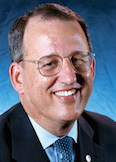Building Carolina's Future
Posted on Sept. 13, 2003For alumni who have not visited Chapel Hill in a while, your next visit is likely to reveal many changes. New buildings are nurturing teaching and learning that you may not have seen before. Even buildings you’ll recognize are, in many cases, undergoing renovations or expansion. It’s a time of much growth for our University.

Doug Dibbert ’70
Carolina is growing in other ways as well – especially in its human capital, without which our University’s physical structures would be far less significant.
The UNC Board of Trustees recently approved the appointment of two new deans: Steven Jones ’74 at the Kenan-Flagler Business School, who started work Aug. 1; and Thomas James at the School of Education, who arrives Nov. 1. As new administrators, they join Robert Blouin, who on July 1 became dean of the UNC School of Pharmacy.
Jones, who was a Morehead Scholar at UNC, served over the course of 12 years as managing director, senior general manager and chief executive officer of SunCorp Metway Ltd. in Australia. Before joining SunCorp Metway, he was a management consultant with McKinsey & Co. in Australia and Atlanta.
For the past seven years, James has led the School of Edu-
cation at New York University as vice dean and as associate dean for academic affairs. He previously was on the faculties of Stanford, Wesleyan and Brown universities.
Led by Jack Richman, dean of UNC’s School of Social Work, a search continues for a new dean of the College of Arts and Sciences. Charles Sanders, who once headed Massachusetts General Hospital and later served as president of Glaxo Pharmaceutical and as a member of the Board of Trustees, is chairing a committee to select a new dean for UNC’s School of Medicine. The person selected also will serve as UNC’s vice chancellor for medical affairs and as chief executive officer of the UNC Health Care System.
And Richard Cole, dean of UNC’s School of Journalism and Mass Communication since 1979, has announced his plans to return to the school’s faculty in 2005.
Beyond these six deans, Carolina continues searches for two more leading administrators: a vice chancellor for student affairs and a vice chancellor for information technology.
Since arriving in August 2000, Chancellor James Moeser has appointed a new vice chancellor for business and finance (Nancy Suttenfield, who began work in November 2000), a new executive vice chancellor and provost (Robert Shelton, who arrived in February 2001) and a new vice chancellor for research and economic development (Tony Waldrop ’74, who returned to Carolina in August 2001) .And Richman became dean of the School of Social Work in October 2002 after serving on the faculty and in administrative posts at UNC for 19 years. Taken together, by the time this academic year ends, the chancellor will have named six of Carolina’s seven vice chancellors and seven of 14 academic deans.
The physical changes to campus also are impressive. Buildings undergoing renovations, and in some cases additions, include the Frank Porter Graham Student Union; Memorial Hall; Peabody Hall, home of the School of Education; the Knapp Building, housing the School of Government; the Old Dental School Building; the Medical Sciences Research Building; Phillips Hall; and Alexander, Conner and Winston residence halls.
Construction projects under way include the Rams Head Center, a School of Public Health teaching research building, the Sonja Haynes Stone Black Cultural Center and the first phase of UNC’s new science complex.
Since the beginning of 2003, seven major capital construction projects valued at more than $115 million have been completed. Fifteen projects, valued at more than $239 million, are under construction. And 58 more projects, valued at more than $677 million, are in design.
Building Carolina is vital for us to attract and retain a world-class faculty, who expect and need up-to-date facilities in which to teach and conduct research, and visionary and experienced administrators to direct our academic enterprise. Building Carolina is critical for us to continue to attract bright and well-prepared students who are eager to learn from a gifted and collaborative faculty in an atmosphere that fosters excellence, inspires critical thinking and encourages collegiality.
And building Carolina allows us to continue to earn the faithful and generous support of our alumni, friends and N.C. taxpayers, who for 210 years have enjoyed an enthusiastic focus on service, a commitment to excellence and an expectation that the First State University forever will seek to be our nation’s leading public university. Building for Carolina’s future requires preserving the campus’s historic architecture and beauty while constructing and equipping needed facilities. And building Carolina’s future means assembling a leadership team to ensure that service, research and teaching within these new and renovated buildings fulfills Carolina’s ambitious mission.
Yours at Carolina,

Douglas S. Dibbert ’70
